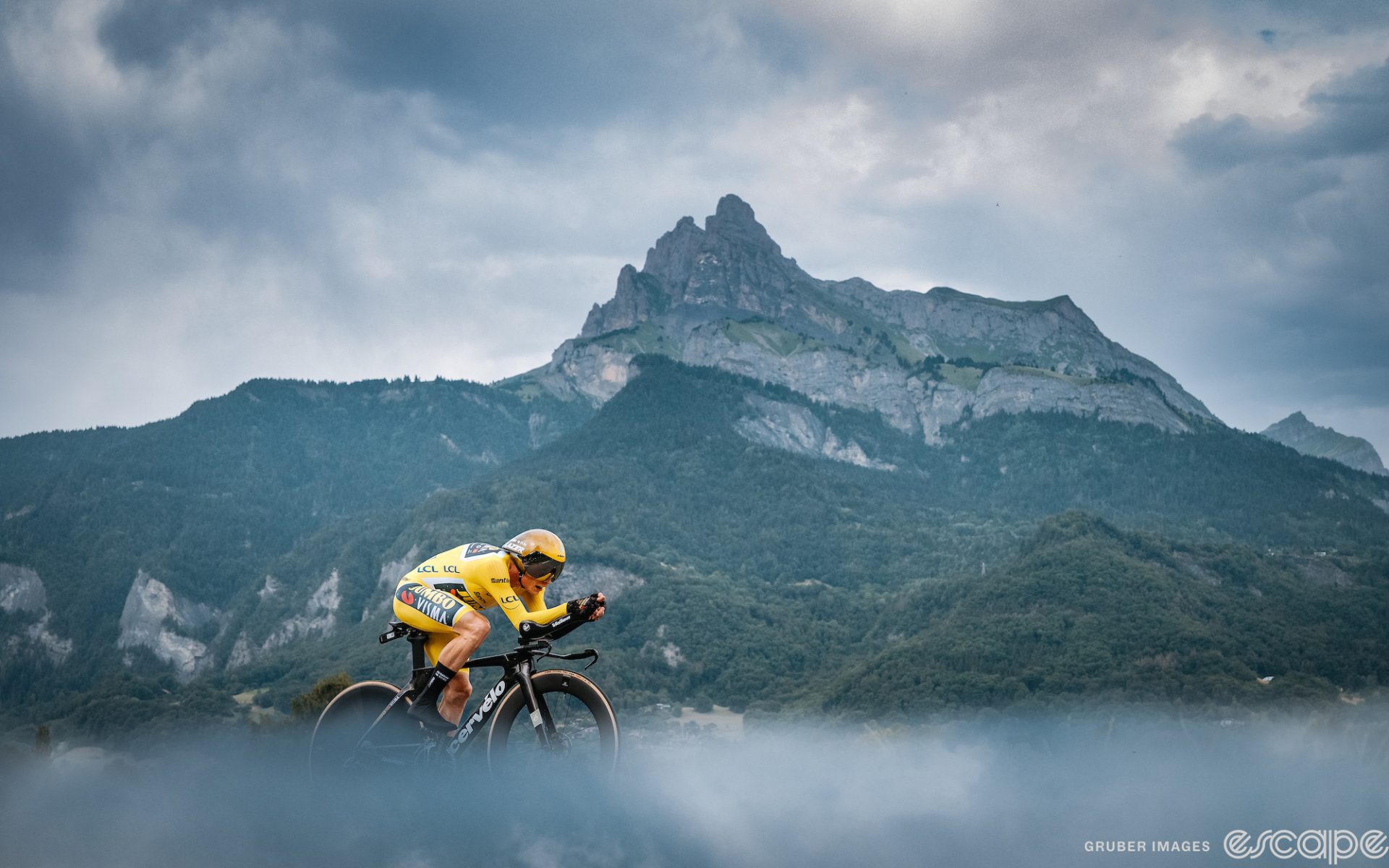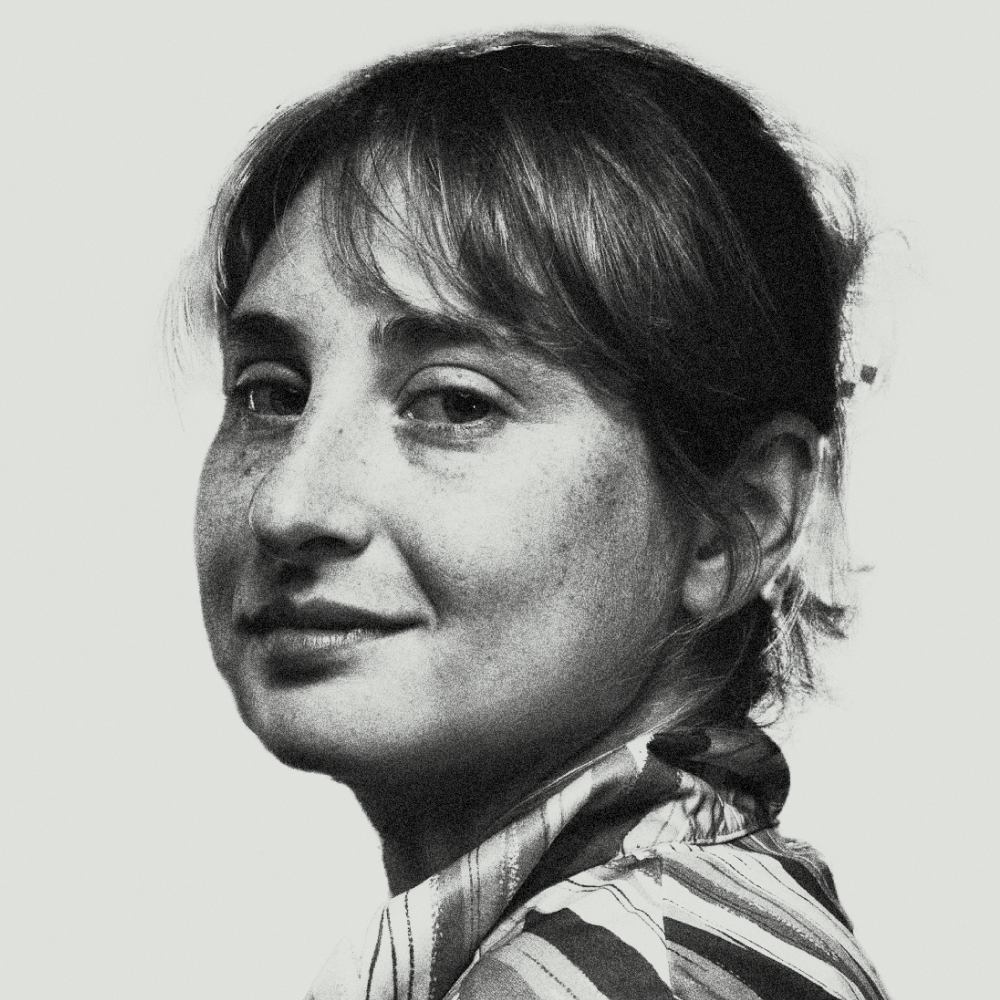I think the most palpable thing about finish lines is not the sense of catharsis that should ostensibly be found there, but the waiting. People on phones, people looking down the road, necks craned. Fans waiting plaintively, bidons and sharpies in hand. Journalists waiting, talking to either each other or into fistfuls of microphone. Wives, girlfriends waiting with wide eyes and pooled pupils. Team staff waiting, their mouths dutiful tight lines that won’t open for anyone.
There is no worse waiting than now, in the the brutal heat and the thick blanket of humidity, and above all, the expectation of an outcome, an answer. There is something, always, about time trials that give us the impression of decision, probably because they are the stage on which we watch one man battle not only his enemy but himself. We see more of what they fear here than in any other condition for victory.
Which of these two men, Tadej Pogačar and Jonas Vingegaard, will answer the question of the Tour de France? At the beginning of the day, it is within possibility that there may be no answer at all. When Pogačar appears on the ramp, he is quietly serious, full face tilted up towards the man’s fingers as they turn into the fist that says start. Vingegaard, when he undergoes the same ritual two minutes later, seems almost grave.
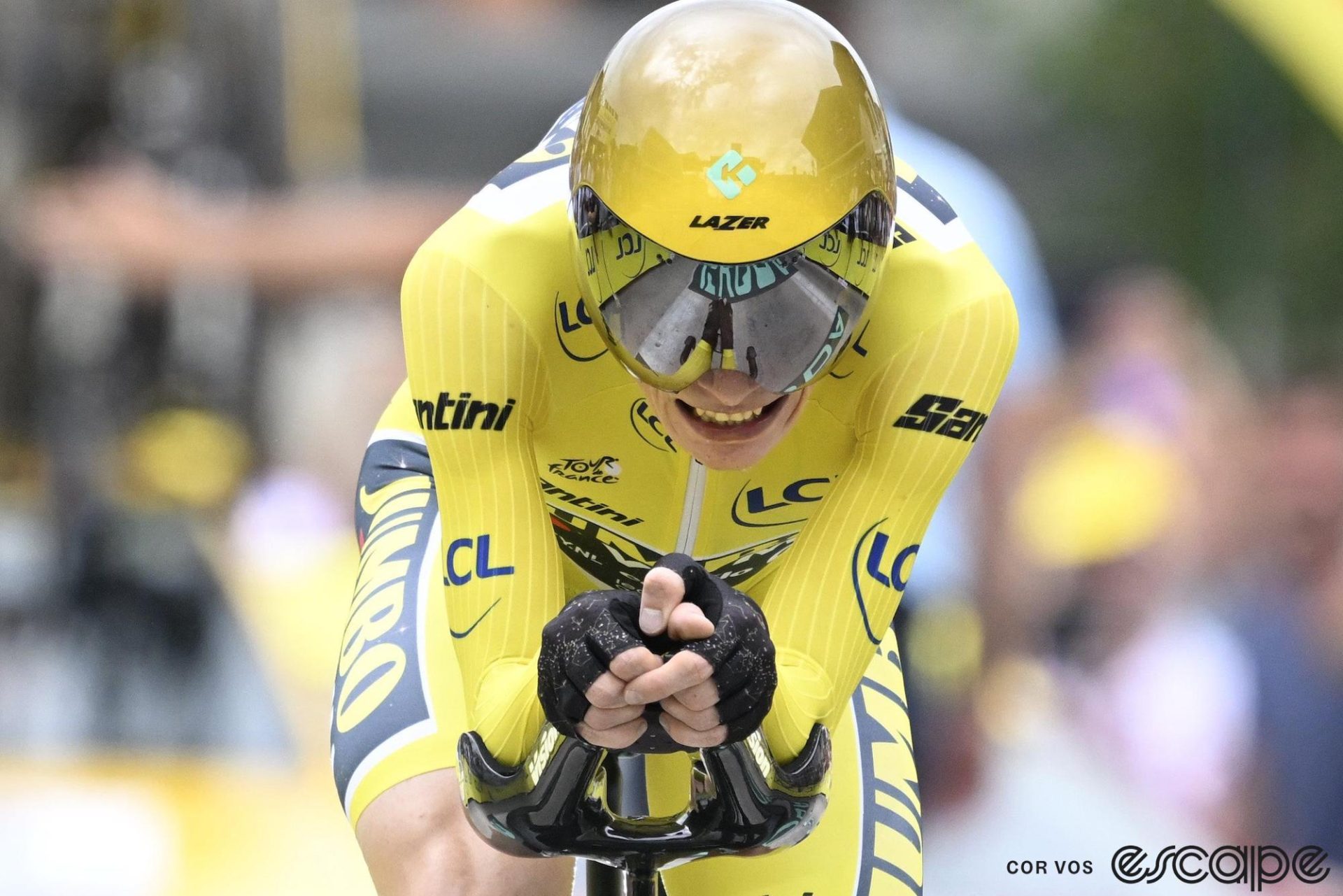
We are on a stretch of road just beyond the sightlines of the finish line, a handful of meters around a corner. In this stretch, it is still. Nauseously still. Nobody knows anything. The televisions for the press are not working and if they are, they drop signal a few minutes after. Everything is revealed in bits and pieces for which we are starved.
We are, I think, in a form of purgatory, have been for two weeks. Not knowing is purgatory. For fans, not having an answer as to which of your two favorites will win is an anticipatory wait for salvation. For journalists, writing longs for denouement and finally conclusion and only then can one pinpoint narratively where the climax was. In Purgatorio, the second part of the Divine Comedy, Dante sees the mountain of purgatory as an allegory for his own reconciliation between classical and religious thought – philosophical logic and belief. For us, on our own mountain, we can recognize in his words our own split between analytical frankness about what is going on and hope, blind and courageous as the hope Dante has in God.
As he ascends up through the layers of souls whose sins are in the process of redemption, and as he approaches paradise, these contradictions, manifested allegorically through Virgil, his guide, the poet of classical antiquity, and Beatrice, his Platonic love who will let him into heaven, become ever more in dialogue with one another. Dante opens up the 11th canto with a version of the Lord’s Prayer as prayed by the proud. He writes what I think can really be seen as a prayer for the Tour de France as prayed by the protagonists:
Give us this day, I beg, our daily manna,
without which here in this harsh desert he
who struggles forward hardest still goes backward.
The first time checks come in and they are even. Of course they are. It only ever gets quieter, the suspense as tangible as the humid air. The riders coming in from their long solo journey pass through the atmosphere of a funeral, ragged, frail in the wake of their struggle, soaked with sweat as though by rain. A ripple rolls through in whispers as someone hears that Vingegaard’s seconds have extended from nothing to 15 over Pogačar. Maybe it means nothing. Maybe it means everything.
A woman behind the barricades grips her Slovenian flag so tightly around her shoulders her knuckles whiten. A child stands a few feet away, transfixed. It is my first day of the Tour the night of which I did not sleep, so sick with dread I was for this day and its purported answers. Through my mind, a list of pros and cons: Vingegaard’s descents. Pogačar’s time spent only on the TT bike. The heat. Pogačar’s psychological levity. It all seemed too even, too unpredictable to even take a side. Everyone here in front of the television is visibly uncomfortable.
A sound bubbles in the crowd, acknowledgement as Thibaut Pinot rolls through and waves to his compatriots. Then Julian Alaphilippe, who is met with more jeers for attention, and if Pinot is content to ride off quietly, Alaphilippe gives his fans a wave and a wink. It’s the only levity that can be found.
Usually, the Tour de France is a big party, so much so that the stillness is unsettling. As though something bad will happen. Thirty seconds Vingegaard has now. In the Slovene press corps, quiet conversation, frank in content as Pogačar struggles to smooth out his bike change, but the faces are those of worry. There’s a plea for rain which doesn’t come. Guillaume Martin arrives, his face as wan as ours. Fifty seconds.
At the announcement of 50 seconds, the waiting takes on a different quality. It’s the waiting for either redemption or acceptance depending on what kind of person you are. As word of the gaps come out, no one, at first, can quite believe that this is how this long, drawn-out fight will end, if it ends thusly. Like Dante ascending through Hell only to arrive at the shores of purgatory where time – disorienting, human time – returns to him and he is frightened. Time is the grounding force in Dante’s purgatory, reorients him when he gets astray in his hopes or tangents. Us also.
When it hits a minute, the grief begins to appear in the corners of eyes, grief that the Tour seems to be over. It sometimes manifests in curses. No one even notices the riders rolling through now. We are trapped in the unfurling of what is happening. On the screen, Pogačar’s face is blank, his eyes saucers. It is an inversion of the look of open astonishment that graced him in 2020 when he did what is being done to him now, which is to say, the impossible, the shocking, the cruel.
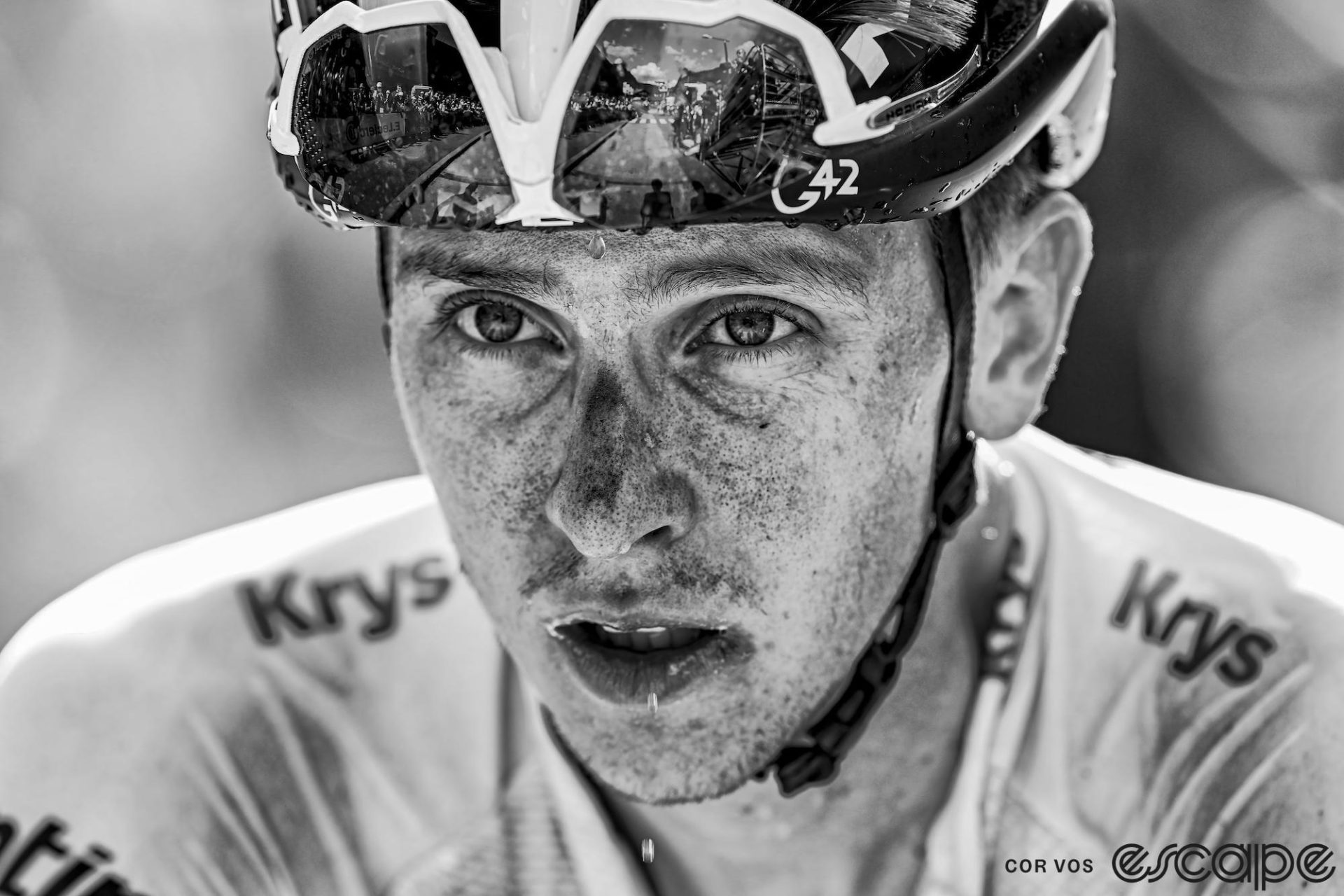
And Vingegaard, he is locked in, expressionless, riding as perfectly in form so as to recall Dante’s images of angels carved into gravestones: “so truly carved there in his tender posture / you could not see him as a speechless image.” Fitting for the death of hope increasingly frothing to the surface as one minute approaches, but never quite reaches two. At the end of Purgatorio, Virgil, a pagan, must leave Dante in the garden of Paradise before Dante can ascend to paradise. Indeed, here, one man is no longer following the other.
The stage ends with Pogačar and Vingegaard still in a league of their own, minutes above the next rider, Wout van Aert, who is nothing to scoff at. There is a sense of disbelief, of sadness. There is muttering under the breath. The joy expected is not where we presently are. I’m sure there is a Danish corner somewhere, I’m sure there is great joy being expressed in many places, all of which is earned. But where the riders stop for us, even the sports directors are matter of fact. No one acts as though the blow has been struck. We all speak as though it were an ordinary day like any other. Sport is sport, my colleague says.
I do not know if the Tour is over. It probably is. Vingegaard, a giant among men, easier in the presser, bright-eyed and clear-spoken, will sleep well tonight. But for those of us in the love of the game of writing, a quiet ending like this one comes with disappointment. Some illusion is shattered. The superhuman has been brought back to earth.
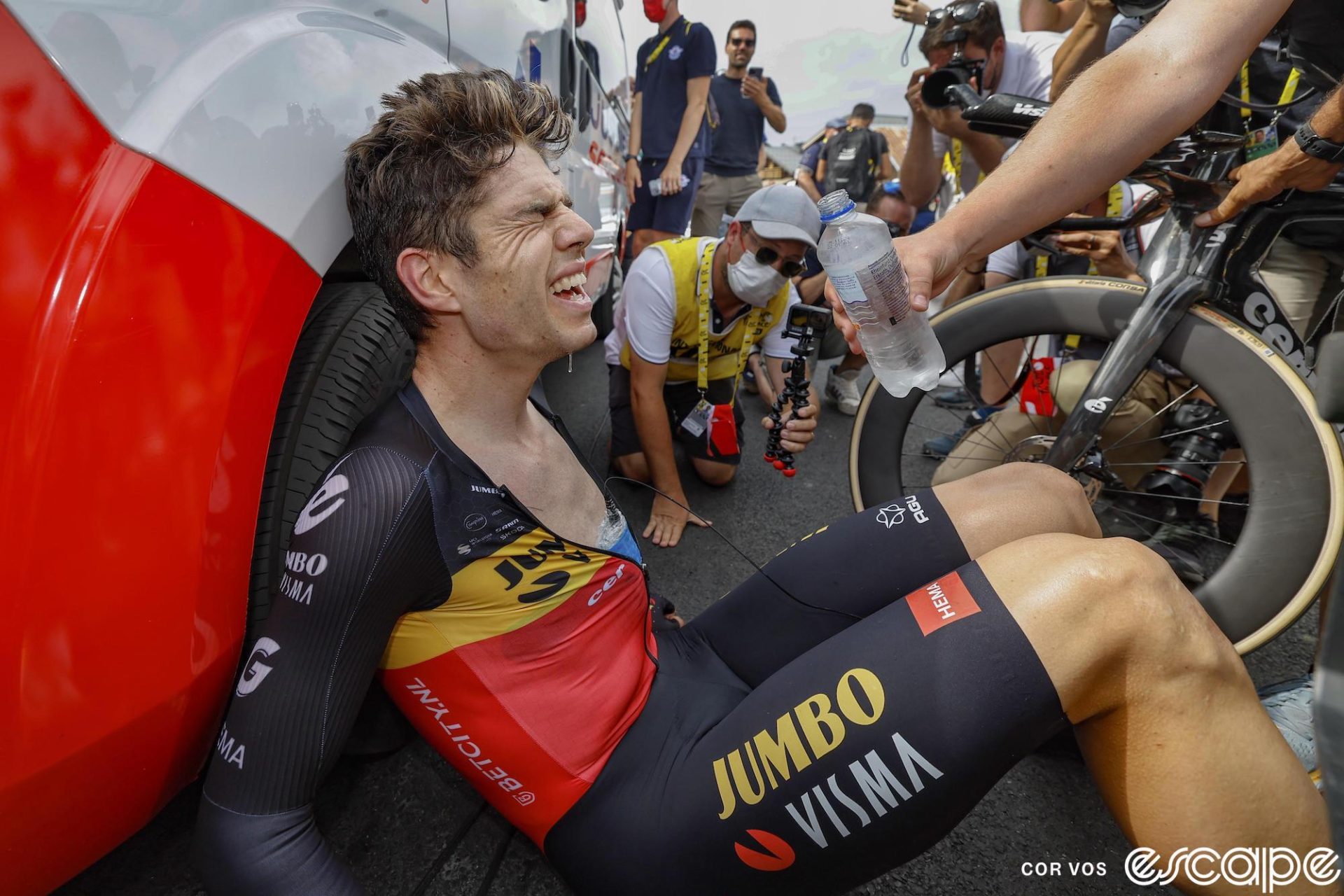
There will be lots of discussion of where Pogačar went wrong. Whether it was getting on the bike too soon after breaking a wrist, whether it was attacking day after day, trying to get free from Vingegaard’s grasp, whether it was in choices made by the team, in equipment, in pacing. We will soon fill in the blank with our own analyses, our own stories, which then take a collective shape.
I used to protest, for example that Roglič’s time trial in 2020 was not bad, it’s just that Pogačar was that much better. But in common mythology, the defeat is still seen as a psychological one even though we have nothing to prove that beyond the interpretations of Roglič’s face of pain. And with Pogačar his loss will likely be remembered as a tactical one – he is the man who flew too close to the sun and now his wings have melted.
I’m a bit of a mystic though. I don’t think we will ever really know what happened except that one was stronger than the other on the day. Only these two men in their heart of hearts will understand themselves. The rest is speculation.
But time? Time is concrete. One minute and 48 seconds.
We remain in purgatory no more.
What did you think of this story?
